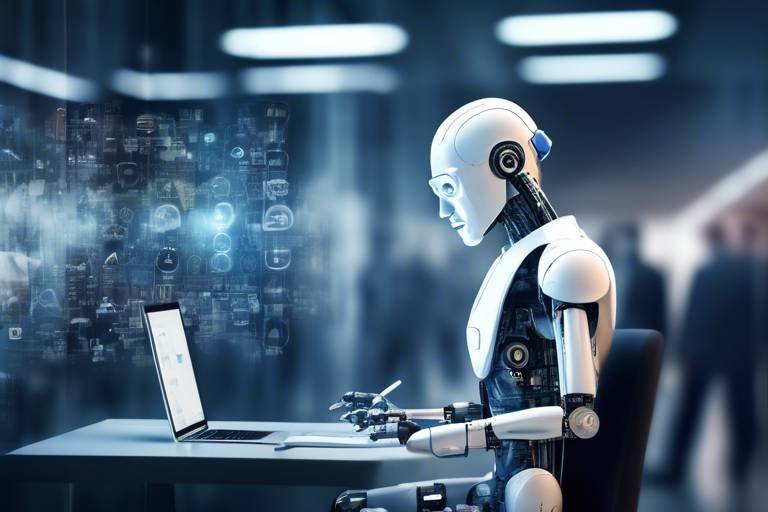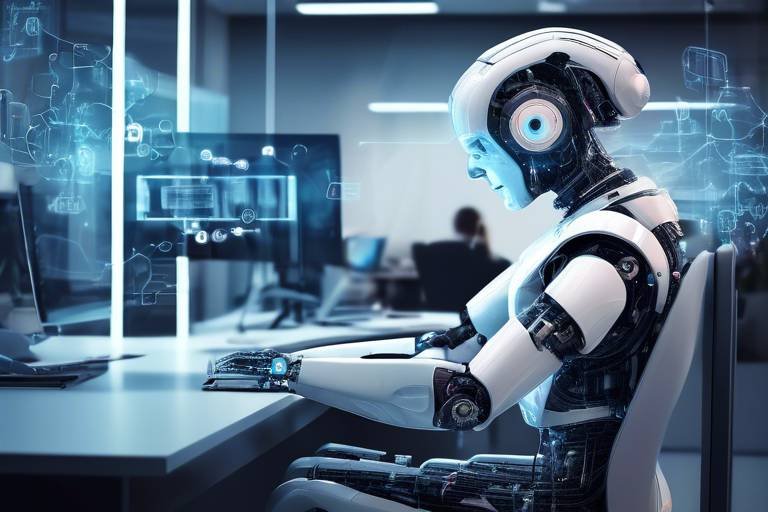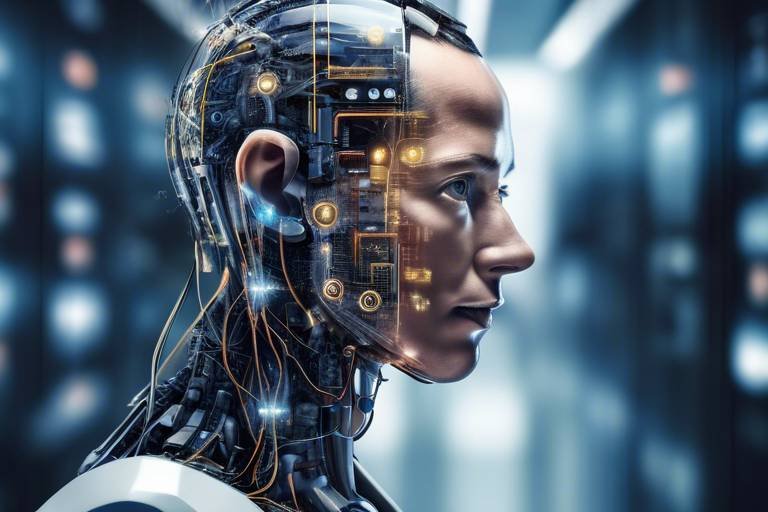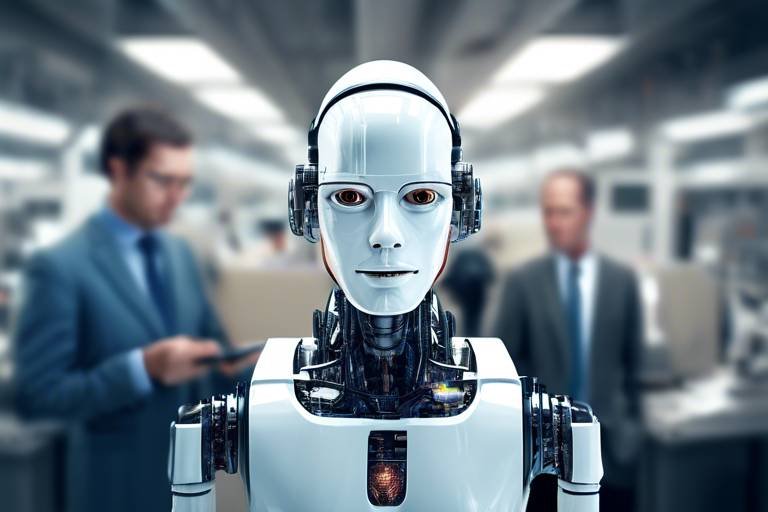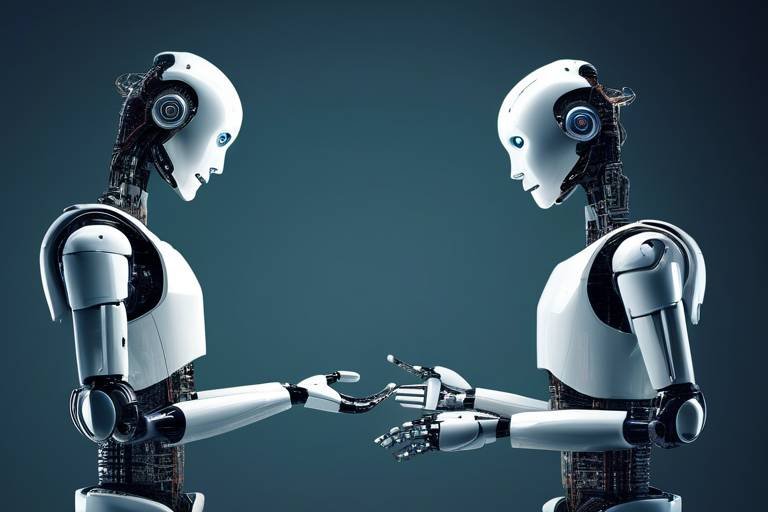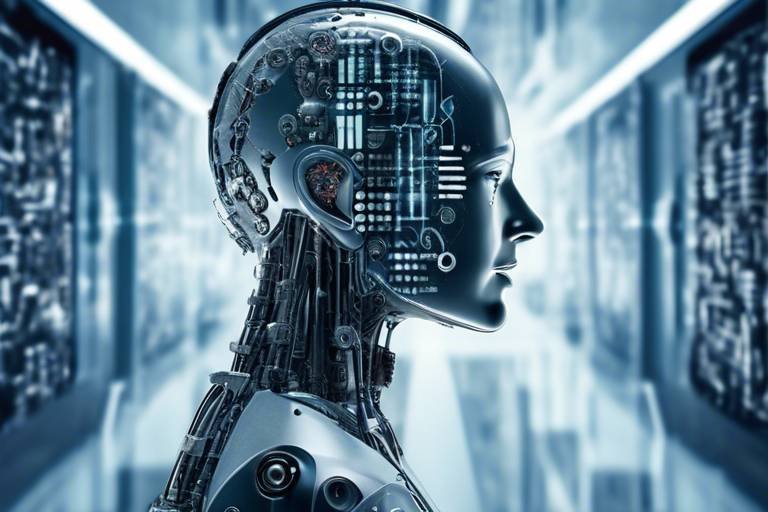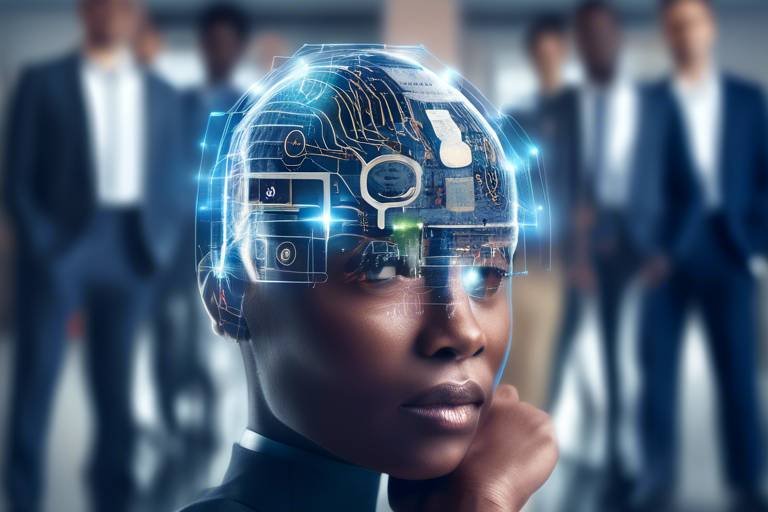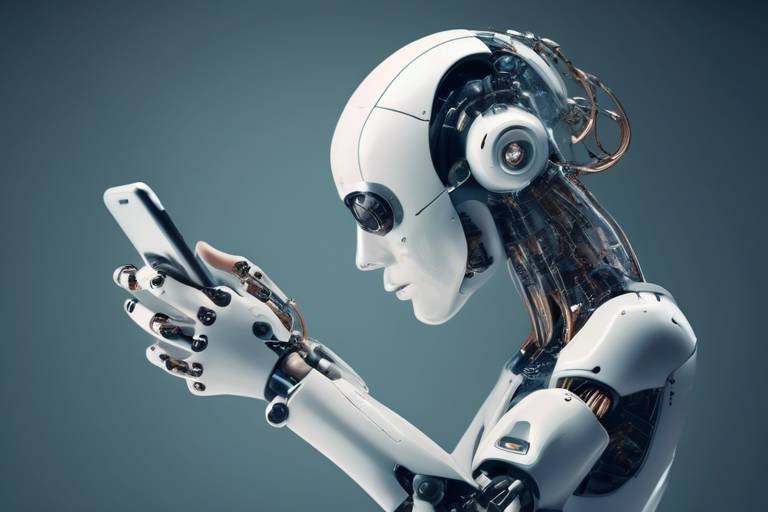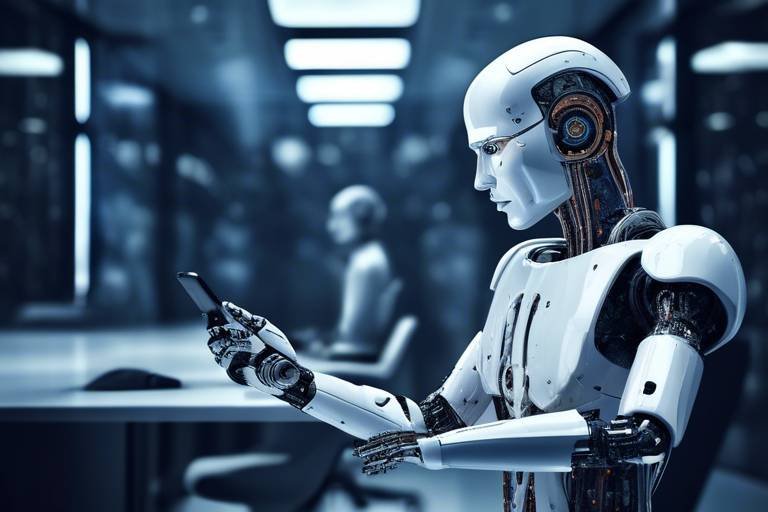AI and Work: Predicting the Job Market of the Future
Artificial Intelligence (AI) is not just a buzzword; it’s a transformative force reshaping our workplaces in ways we never imagined. As we stand on the brink of a new era, the job market is evolving rapidly, presenting both exciting opportunities and daunting challenges. Have you ever wondered how AI will affect your career path? Or what skills you might need to stay relevant in this brave new world? This article dives deep into the intricate relationship between AI and the job market, examining the trends that are emerging, the skills that will be in high demand, and the impact on job security. Buckle up, because the future of work is not just coming; it's already here, and it's time to get prepared!
As AI continues to evolve, it's creating a plethora of new job roles that require unique skill sets. Think of it as a fresh canvas where innovative careers are being painted. For instance, positions like AI ethicists, data scientists, and machine learning engineers are becoming increasingly common. These roles not only require technical expertise but also a deep understanding of how AI systems function and their implications on society. Understanding these emerging roles can help workers prepare for the future job market, ensuring they remain relevant and valuable. Isn’t it fascinating to think about how a job title that didn't exist a decade ago could be your dream career tomorrow?
The future job market will prioritize specific skills that complement AI technologies. Identifying these in-demand skills can guide education and training initiatives for both current and future employees. Workers will need to focus on a mix of technical and soft skills to thrive. So, what skills should you be honing? Let’s break it down.
In an AI-driven workplace, technical skills such as programming and data analysis are becoming critical. Workers must adapt to these requirements to thrive in the changing job landscape. Imagine walking into a job interview and confidently discussing how you can leverage AI to solve complex problems—that's the kind of edge you want to have!
Familiarity with programming languages like Python and R will be essential for many emerging tech roles. These languages are the backbone of AI development, enabling professionals to create and maintain AI applications effectively. If you think about it, learning these languages is akin to learning a new dialect in the vast world of technology—one that opens doors to exciting opportunities.
Data literacy is becoming increasingly important as organizations rely on data-driven decision-making. Employees must learn to interpret and analyze data to provide valuable insights. This skill is not just about crunching numbers; it’s about telling a story with data. Imagine being the person who can turn raw data into actionable strategies—now that’s a superpower in the workplace!
In addition to technical abilities, soft skills such as creativity, emotional intelligence, and adaptability will be vital in navigating the complexities of AI integration in the workplace. In a world where machines can process information faster than humans, it’s our uniquely human traits that will set us apart. Think of soft skills as the secret sauce that enhances your technical skills, making you not just a worker, but a valuable team member.
The rise of AI raises concerns about job security as automation may replace certain roles. Understanding this impact is crucial for workers to strategize their career paths. It's natural to feel apprehensive about job displacement, but it’s essential to focus on the opportunities that arise from these changes. Are you ready to pivot and adapt?
Automation will likely take over repetitive tasks, leading to job displacement in specific sectors. Workers must be aware of these changes to adapt their skills accordingly. However, this doesn’t mean the end of jobs; rather, it signals a shift in the type of work that will be available. Think of it this way: while robots might handle the mundane tasks, humans can focus on creativity and complex problem-solving.
Reskilling and upskilling initiatives are essential for workers facing job displacement. Organizations and employees must collaborate to ensure a smooth transition into new roles. Companies that invest in their employees' growth not only foster loyalty but also create a more competent workforce. It’s a win-win situation!
Education systems need to evolve to meet the demands of an AI-driven workforce. Innovative curricula can prepare students for future job opportunities and challenges. It's time for educational institutions to rethink their strategies and focus on equipping students with the necessary tools to thrive in this new landscape.
Curriculum development must focus on interdisciplinary learning, integrating technology, and fostering critical thinking skills to equip students for the complexities of the job market. Imagine a classroom where students collaborate on AI projects, blending creativity with technology—that’s the future we need!
Collaborations between educational institutions and industry leaders can enhance training programs, ensuring that graduates possess the relevant skills and knowledge for future employment. These partnerships can provide students with invaluable real-world experience, making them job-ready upon graduation.
As AI becomes more prevalent, ethical considerations surrounding its use in the workplace must be addressed. Understanding these issues is vital for creating a fair and equitable job market. We must ask ourselves: how can we ensure that AI serves humanity and not the other way around?
Addressing bias in AI algorithms is crucial to ensure fair hiring practices. Organizations must implement strategies to mitigate bias and promote diversity in the workplace. This is not just about compliance; it’s about creating a culture that values inclusivity and fairness.
With AI's reliance on data, privacy concerns are paramount. Companies must prioritize data protection and transparency to build trust with employees and customers. In a world where personal data is currency, safeguarding it is not just ethical; it’s essential for business longevity.
Analyzing future workforce trends can provide insights into how AI will shape job markets. Recognizing these trends can help workers and organizations strategize effectively. So, what can we expect moving forward?
AI technologies are facilitating remote work, leading to a more flexible job market. Understanding this shift can help workers adapt to new ways of working. Remote work is not just a trend; it’s a fundamental change in how we view work-life balance.
The gig economy is expected to grow alongside AI advancements, offering new forms of employment. Workers must navigate this landscape to find opportunities that align with their skills and goals. Think of the gig economy as a buffet of opportunities—choose what suits your palate!
- Will AI replace all jobs? Not all jobs will be replaced, but many will change. Workers will need to adapt their skills to remain relevant.
- What skills should I learn for the future job market? Focus on technical skills like programming and data analysis, as well as soft skills like creativity and adaptability.
- How can I prepare for the impact of AI on my career? Stay informed about industry trends, invest in your education, and be willing to reskill or upskill as needed.

Emerging Job Roles
As we stand on the brink of a technological revolution, the job market is undergoing a seismic shift, primarily driven by the rise of artificial intelligence. This evolution is not just about machines taking over existing jobs; it's about the creation of entirely new roles that demand a fresh set of skills and competencies. Imagine a world where your job title could be something you've never even heard of! These emerging roles are vital for anyone looking to stay relevant in a rapidly changing landscape.
One of the most exciting aspects of this transformation is the emergence of roles that blend technology with human creativity and empathy. For instance, positions like AI Ethicist are becoming increasingly important as organizations grapple with the ethical implications of AI deployment. These professionals will navigate the complex waters of AI ethics, ensuring that technology is used responsibly and equitably. Similarly, roles such as Data Curator are gaining traction, where individuals will be tasked with organizing and managing data to make it accessible and useful for decision-makers.
Moreover, the healthcare sector is seeing a surge in demand for Health Informatics Specialists. These professionals leverage AI to improve patient care, analyzing vast amounts of health data to identify trends and enhance treatment protocols. In the realm of marketing, we have AI Marketing Specialists who utilize AI tools to analyze consumer behavior and tailor marketing strategies accordingly. The beauty of these roles lies in their interdisciplinary nature, combining skills from various fields to foster innovation.
To better understand the variety of emerging job roles, consider the following table:
| Job Role | Description | Key Skills Required |
|---|---|---|
| AI Ethicist | Ensures ethical AI deployment and addresses biases. | Critical thinking, ethics, policy analysis |
| Data Curator | Organizes and manages data for accessibility and utility. | Data management, analytical skills, attention to detail |
| Health Informatics Specialist | Improves patient care through data analysis. | Healthcare knowledge, data analysis, communication |
| AI Marketing Specialist | Uses AI to analyze consumer behavior for marketing strategies. | Marketing knowledge, data analysis, creativity |
As we look ahead, it's clear that the job market will not only require traditional skills but also an openness to learning and adapting to new technologies. The ability to collaborate with AI will become a cornerstone of many professions, and those who embrace this change will find themselves at the forefront of the workforce. So, are you ready to step into the future and explore these exciting new opportunities?
- What are some examples of emerging job roles in AI? Roles such as AI Ethicist, Data Curator, and AI Marketing Specialist are becoming increasingly important.
- How can I prepare for these new job roles? Focus on developing both technical and soft skills, stay informed about AI advancements, and consider relevant training or education.
- Will AI replace existing jobs? While AI may automate certain tasks, it will also create new roles that require human skills, ensuring a dynamic job market.

Skills in Demand
As we venture deeper into the era of artificial intelligence, the job market is undergoing a significant transformation. This evolution is not just about machines taking over tasks; it's also about the skills that will be in high demand for the workforce of tomorrow. Workers must adapt to this new landscape by honing specific abilities that complement AI technologies. So, what are these skills? Let’s dive into the essentials!
First and foremost, technical skills are becoming increasingly critical in an AI-driven workplace. As industries integrate more advanced technologies, the need for professionals who can navigate this complex environment will grow. Skills such as programming, data analysis, and machine learning will be at the forefront of this demand. For instance, familiarity with programming languages like Python and R is essential for many emerging tech roles, enabling professionals to develop and maintain AI applications effectively.
Moreover, data literacy is not just a buzzword; it's a necessity. Organizations are relying heavily on data-driven decision-making, and employees must learn to interpret and analyze data to provide valuable insights. Being able to sift through vast amounts of information and extract actionable insights will set candidates apart in the job market. This skill will empower workers to make informed decisions that can drive company success.
However, it’s not all about technical know-how. The future job market will also place a high value on soft skills. These include creativity, emotional intelligence, and adaptability. In a world where automation handles routine tasks, the ability to think creatively and solve problems will be indispensable. Employers will seek individuals who can adapt to changing circumstances and collaborate effectively with both machines and humans.
To illustrate the balance between technical and soft skills, consider the following table that highlights the skills in demand:
| Skill Type | Examples | Importance |
|---|---|---|
| Technical Skills | Programming (Python, R), Data Analysis, Machine Learning | Critical for developing and maintaining AI systems |
| Soft Skills | Creativity, Emotional Intelligence, Adaptability | Essential for problem-solving and collaboration |
In conclusion, understanding the skills in demand is vital for anyone looking to thrive in the future job market. It’s not just about keeping up with technology; it’s about blending technical prowess with interpersonal abilities. As we navigate this new frontier, workers who invest in developing both sets of skills will find themselves well-prepared to seize opportunities and overcome challenges in their careers.
- What are the most important technical skills for the future job market?
Skills such as programming, data analysis, and machine learning will be critical. - How can I improve my data literacy?
Consider taking online courses or workshops focused on data analysis and visualization tools. - Why are soft skills important in an AI-driven workplace?
Soft skills enhance collaboration and creativity, which are essential in a landscape increasingly dominated by automation.

Technical Skills
In the rapidly evolving landscape of work, are no longer just a bonus—they're becoming essential. As artificial intelligence (AI) takes center stage in various industries, the demand for professionals who can navigate this technology is skyrocketing. Think of technical skills as the toolkit that allows you to build a career in this new world. Without them, you're like a carpenter without a hammer; you might have the vision, but you won't be able to create anything useful.
One of the most critical technical skills in the AI-driven workplace is programming. Familiarity with programming languages like Python and R is becoming a prerequisite for many roles. These languages are not just for software developers; they are increasingly vital for data analysts, machine learning engineers, and even marketers who want to leverage data analytics for better decision-making. For instance, Python is renowned for its simplicity and versatility, making it a favorite among beginners and experts alike. This programming language allows professionals to create algorithms that can process vast amounts of data efficiently.
Another technical skill that is gaining traction is data literacy. In a world where data drives decisions, being able to interpret and analyze data is crucial. Companies are now looking for employees who can sift through data sets and extract valuable insights. Imagine being a detective piecing together clues to solve a mystery; that's what data literacy is all about. It empowers you to make informed decisions that can significantly impact your organization. As such, understanding data visualization tools and statistical analysis will set you apart in the job market.
To illustrate the importance of these skills, consider the following table that highlights the key technical skills and their relevance in the AI landscape:
| Technical Skill | Description | Relevance |
|---|---|---|
| Programming (Python, R) | Languages used for developing and maintaining AI applications. | High - Essential for tech roles. |
| Data Literacy | The ability to read, analyze, and interpret data. | High - Crucial for decision-making. |
| Machine Learning | Understanding algorithms that enable systems to learn from data. | Medium - Growing importance in various sectors. |
| Cloud Computing | Using remote servers for data storage and processing. | Medium - Increasingly relevant for scalability. |
As we move forward, it’s clear that workers who invest time in developing these technical skills will not only enhance their employability but also their capacity to contribute meaningfully to their organizations. Remember, the world of AI is not just about machines; it’s about the people who can make those machines work for them. So, are you ready to pick up that toolkit and start building your future?
- What are the most important technical skills for the future job market? The most important skills include programming (especially in Python and R), data literacy, machine learning, and cloud computing.
- How can I develop my technical skills? You can develop your skills through online courses, coding bootcamps, and hands-on projects that allow you to practice what you learn.
- Is it too late to learn technical skills? Absolutely not! It's never too late to learn, and many resources are available for all skill levels.
- How do technical skills complement soft skills? Technical skills enable you to perform specific tasks, while soft skills like communication and emotional intelligence help you work effectively with others and adapt to changes.

Programming Languages
In today's rapidly evolving technological landscape, play a pivotal role in shaping the future of work, especially in the realm of artificial intelligence (AI). As organizations increasingly rely on AI systems, the demand for skilled professionals who can navigate these tools is skyrocketing. So, what does this mean for you? Well, if you're looking to future-proof your career, diving into programming languages is a smart move.
Among the myriad of programming languages available, a few stand out as essential for those aiming to work with AI technologies. For instance, Python has emerged as the go-to language for AI development due to its simplicity and versatility. Its extensive libraries, such as TensorFlow and PyTorch, make it easier for developers to build and train machine learning models. On the other hand, R is particularly favored in statistical analysis and data visualization, making it invaluable for data-driven decision-making processes.
But it’s not just about learning one language; understanding the strengths and weaknesses of various programming languages can give you a competitive edge. Here’s a quick look at some key languages that are making waves in the AI arena:
| Programming Language | Key Features | Common Use Cases |
|---|---|---|
| Python | Easy syntax, extensive libraries | Machine learning, data analysis |
| R | Statistical analysis, data visualization | Data science, academia |
| Java | Platform-independent, robust | Large-scale systems, enterprise applications |
| C++ | High performance, control over system resources | Game development, real-time systems |
Moreover, as AI continues to advance, new programming languages may emerge, or existing ones may evolve to better serve the needs of developers and organizations alike. This means that continuous learning and adaptation are crucial. Think of it like riding a wave; if you want to stay afloat, you need to keep paddling and adjusting your balance.
In conclusion, embracing programming languages, especially those tailored for AI, is not just an option—it's a necessity for anyone looking to thrive in the future job market. Whether you choose to specialize in Python for machine learning or R for data analysis, the key is to start exploring now. The sooner you dive in, the better equipped you'll be to ride the wave of change that AI is bringing to the workplace.
- What programming languages should I learn for AI? Python and R are highly recommended due to their extensive libraries and community support.
- Is it necessary to learn multiple programming languages? While it's beneficial to know more than one, starting with one language and mastering it is a great approach.
- How can I practice my programming skills? There are numerous online platforms like Codecademy, Coursera, and LeetCode where you can practice coding challenges and projects.

Data Literacy
In today’s fast-paced, data-driven world, has become a crucial skill for professionals across all industries. But what does it really mean to be data literate? Essentially, it involves the ability to read, understand, create, and communicate data as information. As organizations increasingly rely on data to drive decision-making, employees who can navigate this landscape will find themselves at a significant advantage.
Imagine walking into a meeting where the latest sales figures are presented. If you're data literate, you can interpret those numbers, grasp the underlying trends, and even predict future outcomes based on the data provided. On the other hand, if you lack this skill, you might find yourself lost in a sea of numbers, unable to contribute meaningfully to the discussion. This disparity can lead to missed opportunities for career advancement and innovation.
To break it down further, data literacy encompasses several key components:
- Understanding Data Sources: Knowing where data comes from and how it's collected is fundamental. This includes recognizing the difference between primary and secondary data sources.
- Data Analysis: The ability to analyze data involves using statistical methods and tools to extract insights. This is where technical skills, such as proficiency in software like Excel or programming languages like Python, come into play.
- Data Visualization: Presenting data in a clear and compelling way is essential. This could involve creating graphs, charts, or dashboards that make complex information more digestible.
- Critical Thinking: Data literacy also requires a critical mindset. Employees must evaluate the quality of data and question its implications, ensuring that decisions are based on sound evidence.
Organizations that prioritize data literacy not only empower their employees but also foster a culture of informed decision-making. Companies can implement training programs to enhance data literacy among their workforce. These programs could include workshops, online courses, or collaborative projects that encourage practical application of data skills.
As we look to the future, it’s clear that data literacy will only grow in importance. With the rise of AI and big data, professionals must be equipped to handle vast amounts of information and extract actionable insights. It’s not just about being able to crunch numbers; it’s about harnessing the power of data to drive innovation and improve business outcomes.
In summary, embracing data literacy is no longer optional; it’s a necessity. As we navigate through an increasingly complex job market, those who can effectively interpret and leverage data will stand out from the crowd. So, whether you’re a seasoned professional or just starting in your career, investing time in developing your data literacy skills could very well be your ticket to success.
- What is data literacy? Data literacy refers to the ability to read, understand, create, and communicate data as information.
- Why is data literacy important? It is essential for making informed decisions and driving innovation in a data-driven world.
- How can I improve my data literacy? You can enhance your data literacy through training programs, online courses, and practical application of data skills.
- What are the key components of data literacy? Key components include understanding data sources, data analysis, data visualization, and critical thinking.

Soft Skills
This article explores the transformative impact of artificial intelligence on the job market, examining trends, opportunities, and challenges that lie ahead for workers and employers alike.
As AI evolves, new job roles are emerging that require unique skill sets. Understanding these roles can help workers prepare for the future job market and ensure they remain relevant.
The future job market will prioritize specific skills that complement AI technologies. Identifying these in-demand skills can guide education and training initiatives for both current and future employees.
Technical skills, such as programming and data analysis, will be critical in an AI-driven workplace. Workers must adapt to these requirements to thrive in the changing job landscape.
Familiarity with programming languages like Python and R will be essential for many emerging tech roles, enabling professionals to develop and maintain AI applications effectively.
Data literacy is becoming increasingly important as organizations rely on data-driven decision-making. Employees must learn to interpret and analyze data to provide valuable insights.
In addition to technical abilities, such as creativity, emotional intelligence, and adaptability will be vital in navigating the complexities of AI integration in the workplace. Think of soft skills as the glue that holds a team together; they foster collaboration and communication, making it easier for individuals to work alongside AI technologies. For instance, creativity allows workers to think outside the box when developing solutions that incorporate AI, while emotional intelligence helps in understanding and managing interpersonal relationships in a tech-driven environment.
Moreover, adaptability is crucial as the landscape of work continues to shift. Workers who can adjust to new technologies and workflows will not only survive but thrive in this evolving job market. Employers are increasingly looking for individuals who can embrace change, learn quickly, and contribute positively to team dynamics. In fact, studies have shown that companies with high emotional intelligence among employees see a significant boost in overall productivity and morale.
Here are some key soft skills that will be essential in the AI-driven workplace:
- Communication: The ability to convey ideas clearly and effectively, both in writing and verbally.
- Teamwork: Working collaboratively with others, including AI systems, to achieve common goals.
- Problem-Solving: The capacity to analyze complex issues and develop innovative solutions.
In summary, while technical skills will undoubtedly play a significant role in the future job market, soft skills will serve as the foundation for successful collaboration and innovation. As we move forward, it’s essential for both workers and employers to recognize the importance of cultivating these abilities alongside technical expertise.
The rise of AI raises concerns about job security as automation may replace certain roles. Understanding this impact is crucial for workers to strategize their career paths.
Automation will likely take over repetitive tasks, leading to job displacement in specific sectors. Workers must be aware of these changes to adapt their skills accordingly.
Reskilling and upskilling initiatives are essential for workers facing job displacement. Organizations and employees must collaborate to ensure a smooth transition into new roles.
Education systems need to evolve to meet the demands of an AI-driven workforce. Innovative curricula can prepare students for future job opportunities and challenges.
Curriculum development must focus on interdisciplinary learning, integrating technology, and fostering critical thinking skills to equip students for the complexities of the job market.
Collaborations between educational institutions and industry leaders can enhance training programs, ensuring that graduates possess the relevant skills and knowledge for future employment.
As AI becomes more prevalent, ethical considerations surrounding its use in the workplace must be addressed. Understanding these issues is vital for creating a fair and equitable job market.
Addressing bias in AI algorithms is crucial to ensure fair hiring practices. Organizations must implement strategies to mitigate bias and promote diversity in the workplace.
With AI's reliance on data, privacy concerns are paramount. Companies must prioritize data protection and transparency to build trust with employees and customers.
Analyzing future workforce trends can provide insights into how AI will shape job markets. Recognizing these trends can help workers and organizations strategize effectively.
AI technologies are facilitating remote work, leading to a more flexible job market. Understanding this shift can help workers adapt to new ways of working.
The gig economy is expected to grow alongside AI advancements, offering new forms of employment. Workers must navigate this landscape to find opportunities that align with their skills and goals.
Q1: Will AI take away all jobs?
A1: While AI may automate certain tasks, it will also create new job opportunities that require human skills, particularly in areas like creativity and emotional intelligence.
Q2: What skills should I focus on developing for the future?
A2: Focus on both technical skills, such as programming and data analysis, and soft skills like communication and adaptability to stay competitive.
Q3: How can I prepare for changes in the job market?
A3: Stay informed about industry trends, pursue continuous learning opportunities, and be open to reskilling or upskilling as needed.

Impact on Job Security
The rise of artificial intelligence (AI) is reshaping the job market in ways we could only dream of a few years ago. However, with great power comes great responsibility, and the concerns surrounding job security are more pressing than ever. As automation and AI technologies evolve, many workers are left wondering: "Will my job still exist in five years?" This question is valid, as the potential for job displacement looms large over various sectors. It's essential to understand how AI impacts job security and what strategies can be employed to mitigate these risks.
One of the most significant ways AI affects job security is through the automation of tasks. Routine and repetitive tasks are prime candidates for automation, which can lead to job displacement in fields such as manufacturing, data entry, and even customer service. For example, chatbots are now handling customer inquiries that once required human interaction. While this innovation improves efficiency and reduces costs for businesses, it also raises the stakes for employees who perform these tasks. Workers must be aware of these changes and proactively adapt their skills to remain relevant in an increasingly automated world.
To navigate this landscape, reskilling and upskilling initiatives are crucial. Organizations and employees must collaborate to ensure a smooth transition into new roles. This could involve providing training programs that focus on developing skills that are less likely to be automated. For instance, roles that require a high degree of creativity, emotional intelligence, and complex problem-solving are less susceptible to AI takeover. Companies can also invest in continuous learning opportunities, allowing employees to acquire new skills that align with the evolving demands of the job market. Here’s a quick overview of how reskilling can be implemented:
| Reskilling Strategies | Description |
|---|---|
| On-the-job Training | Employees learn new skills while performing their current job, allowing for immediate application of knowledge. |
| Online Courses | Access to a wide range of courses helps employees learn at their own pace and fit education into their busy lives. |
| Mentorship Programs | Pairing less experienced employees with seasoned professionals can foster knowledge sharing and skill development. |
As we consider the impact of AI on job security, it’s also essential to recognize the opportunities it presents. While some jobs may disappear, new roles will emerge that require unique skill sets. The key is to stay informed about industry trends and be willing to adapt. For instance, jobs in AI ethics, data analysis, and AI maintenance are on the rise. By focusing on these new opportunities, workers can position themselves favorably in the job market.
In conclusion, the impact of AI on job security is a double-edged sword. While automation may threaten certain roles, it also opens up avenues for growth and innovation. Workers must be proactive in embracing change, reskilling, and adapting to new technologies. By doing so, they can not only secure their jobs but also thrive in an AI-driven future.
- Will AI take away all jobs? While AI may automate certain tasks, it will also create new job opportunities that require human skills.
- What skills should I focus on to remain employable? Focus on developing both technical skills, like programming and data analysis, and soft skills, such as creativity and emotional intelligence.
- How can I reskill for a job in an AI-driven market? Consider online courses, mentorship programs, and on-the-job training to acquire new skills relevant to the evolving job landscape.
- Are there industries more affected by AI than others? Yes, industries like manufacturing, retail, and customer service are particularly at risk for job displacement due to automation.

Automation of Tasks
The rise of artificial intelligence (AI) has ushered in a new era of automation, fundamentally changing the way we work. As companies increasingly integrate AI technologies, they are finding that many of the tasks traditionally performed by humans can be efficiently handled by machines. This shift is not merely a trend; it represents a profound transformation in the workplace landscape. Think of it like a tidal wave—once it starts rolling in, there's no stopping it. So, what does this mean for the workforce?
First and foremost, it's important to recognize that while automation can lead to increased efficiency and productivity, it also raises significant concerns about job displacement. Many roles, especially those involving repetitive tasks, are at risk of being replaced by AI systems. For example, jobs in manufacturing, data entry, and even customer service are increasingly being automated. This doesn't mean that all jobs will disappear, but rather that the nature of work will evolve. Workers need to be aware of these changes and prepare accordingly.
To illustrate the impact of automation, consider the following table that outlines some common tasks and their potential for automation:
| Task | Automation Potential | Example Technology |
|---|---|---|
| Data Entry | High | Robotic Process Automation (RPA) |
| Customer Support | Medium | Chatbots |
| Manufacturing Assembly | High | Industrial Robots |
| Content Creation | Low to Medium | AI Writing Assistants |
As you can see, the potential for automation varies significantly across different tasks. While some roles may be fully automated, others will evolve, requiring workers to adapt their skills. This is where the concept of reskilling and upskilling becomes crucial. Workers must embrace continuous learning to stay relevant in a rapidly changing job market. For instance, a data entry clerk might transition into a data analyst role, leveraging their understanding of data while acquiring new analytical skills.
Moreover, it’s essential to understand that automation doesn’t just replace jobs; it also creates new opportunities. As AI takes over mundane tasks, human workers can focus on more complex, creative, and strategic roles. This shift can lead to increased job satisfaction and productivity. Imagine a world where you can spend less time on tedious tasks and more time on innovative projects that genuinely interest you. Sounds appealing, right?
In conclusion, while the automation of tasks presents challenges, it also offers a chance for growth and evolution in the workforce. Workers who proactively adapt to these changes by acquiring new skills and embracing lifelong learning will find themselves well-positioned for success in the future job market. The key is to stay informed, be flexible, and, most importantly, maintain a positive outlook on the possibilities that lie ahead.
- Will AI completely replace human jobs? While AI will automate certain tasks, it will also create new roles that require human skills.
- What can I do to prepare for an AI-driven job market? Focus on developing both technical and soft skills, and consider reskilling or upskilling in your current field.
- How can companies support employees facing job displacement? Organizations can implement reskilling programs and provide career transition assistance to help employees adapt.

Reskilling and Upskilling
As the job market evolves due to the increasing influence of artificial intelligence, the concepts of reskilling and upskilling have become more crucial than ever. Workers find themselves at a crossroads, where the skills they once relied on may no longer suffice in a rapidly changing landscape. Reskilling involves learning new skills to transition into a different job role, while upskilling focuses on enhancing existing skills to improve performance in the current position. Both approaches are essential for employees aiming to stay relevant and competitive.
Employers and employees alike must recognize that the future of work is not just about technology; it’s about the people who wield that technology. A collaborative effort between organizations and their workforce is needed to ensure that reskilling and upskilling initiatives are effective. Companies should invest in training programs that provide employees with the necessary tools to adapt to new technologies and methodologies. This investment not only benefits the individual but also enhances the overall productivity and innovation within the organization.
Consider the following key areas where reskilling and upskilling are particularly vital:
- Digital Literacy: In a world dominated by AI, understanding digital tools and platforms is paramount. Employees should be proficient in using various software and applications that facilitate their work.
- AI and Machine Learning: Familiarity with AI concepts and machine learning processes can empower workers to leverage these technologies in their roles, making them invaluable assets to their teams.
- Soft Skills Development: As automation takes over routine tasks, skills like creativity, problem-solving, and emotional intelligence will become increasingly important. These skills can’t be automated and are essential for collaboration and innovation.
Moreover, organizations can adopt various strategies to foster a culture of continuous learning:
- Mentorship Programs: Pairing experienced employees with those looking to learn can create a supportive environment where knowledge is shared effectively.
- Online Learning Platforms: Providing access to online courses allows employees to learn at their own pace and convenience, making it easier to fit training into their busy schedules.
- Feedback Mechanisms: Regular feedback can guide employees on areas of improvement and help them focus on the skills that matter most.
In conclusion, as we navigate through the AI-driven future, the importance of reskilling and upskilling cannot be overstated. Workers who embrace lifelong learning and organizations that prioritize employee development will not only survive but thrive in this new era. By fostering a culture that values adaptability and growth, we can all contribute to a more resilient workforce ready to tackle the challenges and opportunities that lie ahead.
Q1: What is the difference between reskilling and upskilling?
A1: Reskilling involves learning new skills to transition into a different job role, while upskilling focuses on enhancing existing skills to improve performance in the current position.
Q2: Why are reskilling and upskilling important in the age of AI?
A2: As AI technologies evolve, many traditional job roles are changing or becoming obsolete. Reskilling and upskilling help workers adapt to these changes, ensuring they remain competitive in the job market.
Q3: How can organizations support reskilling and upskilling initiatives?
A3: Organizations can provide training programs, mentorship opportunities, access to online learning platforms, and create a culture that encourages continuous learning.
Q4: What skills should I focus on for future job opportunities?
A4: Focus on developing digital literacy, understanding AI and machine learning, and enhancing soft skills like creativity and emotional intelligence.

The Role of Education
The rapid evolution of artificial intelligence (AI) is reshaping the workforce, and education plays a pivotal role in preparing individuals for this new reality. As we step into an era where AI technologies are integrated into various sectors, the traditional education system must undergo significant transformations. This means not just teaching students the basics, but also equipping them with the skills necessary to thrive in a tech-driven environment. It's about creating a learning ecosystem that fosters innovation, creativity, and critical thinking.
To address the challenges posed by AI, curriculum development should focus on interdisciplinary learning. This approach encourages students to draw connections between different fields, such as technology, science, and the arts. For example, a student studying environmental science should also learn about data analysis and programming to understand how AI can be leveraged in environmental conservation efforts. By integrating these subjects, we can cultivate a generation of thinkers who are not only knowledgeable but also adaptable to the ever-changing job landscape.
Moreover, educational institutions must forge partnerships with industry leaders to ensure that training programs are relevant and up-to-date. Collaborations can lead to internships, workshops, and real-world projects that provide students with hands-on experience. When students engage with professionals, they gain insights into the skills that employers are looking for, which ultimately enhances their employability. For instance, tech companies can offer coding boot camps at universities, allowing students to learn programming languages that are in high demand.
Another critical aspect of education in the age of AI is the emphasis on soft skills. While technical knowledge is essential, employers increasingly value attributes like creativity, emotional intelligence, and adaptability. These skills enable individuals to collaborate effectively, solve complex problems, and navigate the nuances of human-AI interaction. Educational systems should, therefore, incorporate activities that promote teamwork, communication, and creative thinking, ensuring that graduates are well-rounded and prepared for the multifaceted challenges of the workplace.
In summary, the role of education in the AI-driven job market cannot be overstated. By focusing on interdisciplinary learning, fostering industry partnerships, and developing both technical and soft skills, we can prepare the workforce of tomorrow. Education must evolve to not only keep pace with technological advancements but to also inspire students to innovate and lead in their respective fields.
- How can educational institutions adapt to AI advancements?
Educational institutions can adapt by updating curricula to include AI-related subjects, fostering partnerships with tech companies, and emphasizing both technical and soft skills. - What types of skills will be most valuable in the future job market?
Technical skills such as programming and data analysis, along with soft skills like creativity and emotional intelligence, will be highly valued. - Why is interdisciplinary learning important?
Interdisciplinary learning helps students connect different fields, fostering innovative thinking and adaptability, which are crucial in an AI-driven world. - How can students prepare for careers in an AI-influenced job market?
Students can prepare by seeking out courses in technology, engaging in internships, and developing both technical and interpersonal skills.

Curriculum Development
The landscape of education is rapidly evolving, particularly in response to the increasing presence of artificial intelligence (AI) in various industries. To prepare students effectively for the future job market, must undergo significant transformations. This involves not only integrating technology into the learning process but also fostering critical thinking skills that will empower students to navigate complex challenges in the workplace.
One of the key aspects of modern curriculum development is the interdisciplinary approach. By blending subjects such as science, technology, engineering, arts, and mathematics (STEAM), educators can create a more holistic learning environment. This approach encourages students to draw connections between different fields, enhancing their problem-solving abilities and creativity. For example, a project that combines coding with environmental science can inspire students to develop innovative solutions for real-world issues.
Moreover, it's essential to incorporate hands-on experiences that allow students to apply their knowledge practically. This could involve partnerships with local businesses or organizations that provide internships or project-based learning opportunities. Such collaborations not only enrich the educational experience but also help students build valuable networks and gain insights into industry expectations.
Additionally, the curriculum should emphasize the importance of soft skills alongside technical knowledge. Skills such as communication, teamwork, and emotional intelligence are increasingly recognized as vital for success in an AI-driven workplace. Educators should create opportunities for students to engage in group projects, presentations, and discussions, which can help them develop these essential interpersonal skills.
To illustrate the importance of a well-rounded curriculum, consider the following table that outlines key components of effective curriculum development:
| Component | Description |
|---|---|
| Interdisciplinary Learning | Integrating multiple subjects to foster holistic understanding. |
| Hands-On Experience | Providing practical opportunities to apply theoretical knowledge. |
| Soft Skills Development | Emphasizing communication, teamwork, and emotional intelligence. |
| Technology Integration | Incorporating current technologies to enhance learning experiences. |
In conclusion, must adapt to the demands of an AI-driven workforce by embracing interdisciplinary learning, providing hands-on experiences, and emphasizing the development of soft skills. By doing so, educational institutions can equip students with the necessary tools to thrive in a rapidly changing job market.
- What is the importance of interdisciplinary learning in curriculum development?
Interdisciplinary learning encourages students to make connections between different fields, enhancing their problem-solving skills and creativity. - How can hands-on experiences benefit students?
Hands-on experiences allow students to apply their knowledge in real-world settings, helping them gain practical skills and industry insights. - Why are soft skills important in the future job market?
Soft skills such as communication and teamwork are essential for collaboration and success in an increasingly AI-driven workplace.

Partnerships with Industry
In today's rapidly evolving job market, collaborations between educational institutions and industry leaders have become more crucial than ever. These partnerships serve as a bridge, connecting the skills taught in classrooms with the real-world demands of employers. By working together, schools and businesses can create a curriculum that not only meets academic standards but also prepares students for the specific challenges they will face in their careers.
One of the key benefits of these partnerships is the ability to provide students with hands-on experience. Internships, co-op programs, and apprenticeships allow learners to apply their knowledge in practical settings, making them more attractive to potential employers. For instance, when students engage in real projects, they develop a deeper understanding of their field and acquire valuable skills that are often not covered in traditional coursework.
Moreover, industry partnerships can help in curriculum development. By collaborating with businesses, educational institutions can identify the skills that are most in-demand and tailor their programs accordingly. This ensures that graduates are not only knowledgeable but also equipped with the practical skills that employers are looking for. For example, a tech company might work with a university to develop a program focused on emerging technologies such as artificial intelligence or cybersecurity, ensuring that students are prepared for the future job market.
Additionally, these partnerships can foster innovation within the educational system. When educators work closely with industry professionals, they can stay updated on the latest trends and technologies, which can lead to the incorporation of cutting-edge tools and methodologies into their teaching. This not only enhances the learning experience for students but also keeps the curriculum relevant in a fast-paced world.
However, establishing effective partnerships requires commitment and ongoing communication. Both parties must be willing to invest time and resources to ensure that the collaboration is mutually beneficial. Regular meetings, feedback sessions, and joint initiatives can help maintain a strong relationship and adapt to the ever-changing landscape of the job market.
In conclusion, partnerships between education and industry are essential for preparing students for the future workforce. By aligning educational outcomes with industry needs, we can create a more skilled and adaptable workforce ready to tackle the challenges of tomorrow. As these collaborations continue to grow, we can expect to see a more seamless transition from education to employment, ultimately benefiting both students and employers alike.
- What are the benefits of partnerships between education and industry?
These partnerships provide students with real-world experience, ensure curricula are aligned with industry needs, and foster innovation in teaching methods.
- How can students benefit from internships offered through these partnerships?
Internships allow students to apply their knowledge practically, gain valuable skills, and enhance their employability.
- What role do industry professionals play in curriculum development?
Industry professionals help identify in-demand skills and provide insights that shape relevant and practical educational programs.
- How can educational institutions maintain strong partnerships with businesses?
Regular communication, feedback sessions, and collaborative initiatives can help sustain effective partnerships.

AI Ethics in the Workplace
The integration of artificial intelligence (AI) into the workplace brings forth a myriad of ethical considerations that must be addressed to foster a fair and equitable job market. As AI systems increasingly influence hiring practices, employee evaluations, and even day-to-day operations, it becomes crucial to prioritize ethics in their deployment. One of the primary concerns is the potential for bias in AI algorithms. If not properly managed, these biases can perpetuate discrimination and inequality, leading to unfair hiring practices and a lack of diversity in the workplace.
Organizations must implement robust strategies to mitigate bias in their AI systems. This involves not only auditing the algorithms for fairness but also ensuring that the data used to train these systems is representative and free from historical prejudices. For instance, companies can establish diverse teams to oversee AI development and regularly review AI outcomes to identify and rectify any disparities that arise. By doing so, they can promote a more inclusive environment where every individual has an equal opportunity to succeed.
Another pressing issue is privacy concerns. As AI technologies often rely on vast amounts of data, the potential for misuse or unauthorized access to personal information is significant. Companies must prioritize data protection and transparency to build trust with both employees and customers. This includes implementing stringent data governance policies, educating employees about data privacy, and ensuring compliance with relevant regulations. By fostering a culture of accountability and respect for privacy, organizations can mitigate risks associated with AI deployment.
Furthermore, ethical considerations extend beyond just bias and privacy. They also encompass the broader impact of AI on job roles and employee well-being. As AI takes over repetitive tasks, it can lead to job displacement, raising questions about the responsibility of organizations to support affected workers. Companies should invest in reskilling and upskilling initiatives to help employees transition into new roles that AI cannot easily replicate. This commitment not only enhances employee loyalty but also contributes to a more resilient workforce.
In conclusion, as AI continues to reshape the workplace, addressing ethical considerations is vital for creating an equitable job market. By actively working to eliminate bias, protect privacy, and support employee transitions, organizations can harness the power of AI while ensuring that ethical standards are upheld. This proactive approach not only benefits the workforce but also enhances the overall reputation and success of the organization in an increasingly AI-driven world.
- What is AI bias, and why is it a concern?
AI bias refers to the prejudices that can arise in AI algorithms due to the data they are trained on. This is a concern because it can lead to unfair treatment of individuals in hiring, promotions, and evaluations. - How can companies mitigate AI bias?
Companies can mitigate AI bias by auditing algorithms for fairness, using diverse data sets, and involving diverse teams in the development process. - What are the privacy concerns associated with AI?
Privacy concerns involve the potential misuse of personal data collected by AI systems, which can lead to unauthorized access and breaches of confidentiality. - How can organizations support employees affected by AI-driven automation?
Organizations can support affected employees through reskilling and upskilling initiatives, helping them transition into new roles that leverage their skills in an AI-enhanced environment.

Bias and Fairness
In the rapidly evolving landscape of artificial intelligence, bias and fairness have emerged as critical issues that organizations must address. As AI systems are increasingly integrated into hiring processes, performance evaluations, and decision-making, it is vital to ensure that these algorithms do not perpetuate existing inequalities. Imagine a world where a candidate's qualifications are overshadowed by biased data; this is the reality we face if we don't tackle these challenges head-on.
Bias in AI can stem from various sources, including the data used to train these systems. If historical data reflects societal biases—whether based on gender, race, or socioeconomic status—AI algorithms may inadvertently learn and replicate these biases. This can lead to unfair hiring practices, where qualified candidates are overlooked simply because the algorithm favors certain demographics over others.
To combat this issue, organizations must implement strategies aimed at promoting diversity and mitigating bias in their AI systems. Here are a few approaches that can be adopted:
- Data Audits: Regularly auditing the data used for training AI models can help identify and eliminate biases.
- Diverse Teams: Building diverse teams to develop and test AI systems can provide varied perspectives and reduce blind spots.
- Bias Mitigation Techniques: Employing algorithmic techniques specifically designed to reduce bias can improve fairness in AI outcomes.
Moreover, transparency is crucial in the AI development process. Organizations should be open about how their algorithms function and the data they are trained on. This transparency not only builds trust with employees and customers but also encourages accountability. When companies are clear about their AI practices, they pave the way for a more equitable job market.
In conclusion, addressing bias and fairness in AI is not just a technical challenge; it is a moral imperative that impacts the lives of countless individuals. By actively working to eliminate bias, organizations can create a fairer workplace where every employee has an equal opportunity to succeed. As we move forward, it is essential to recognize that the responsibility lies not only with technology developers but also with employers and society as a whole.
- What is bias in AI? Bias in AI refers to the systematic favoritism of certain groups over others in decision-making processes due to flawed data or algorithms.
- How can organizations reduce bias in AI? Organizations can reduce bias by conducting data audits, fostering diverse teams, and employing bias mitigation techniques in their algorithms.
- Why is transparency important in AI? Transparency is vital as it builds trust, encourages accountability, and helps ensure that AI systems are fair and equitable.

Privacy Concerns
As artificial intelligence continues to integrate into various aspects of our lives, the issue of privacy looms larger than ever. With AI systems relying heavily on vast amounts of data, the potential for misuse or unintended consequences is a growing concern. Imagine a world where every click, every interaction, and every preference is meticulously tracked and analyzed. This is not just a dystopian fantasy; it is becoming a reality for many individuals in today's digital age.
One of the primary concerns surrounding AI is the collection and storage of personal data. Organizations often gather data to enhance their services or improve customer experiences. However, this data collection can lead to significant privacy risks, especially if sensitive information is not adequately protected. For instance, consider how many apps and websites require you to share personal information just to access basic features. This data can be vulnerable to breaches, leaving individuals exposed to identity theft and other malicious activities.
Moreover, the issue of transparency arises. Many users are unaware of how their data is being used or who has access to it. This lack of clarity can breed mistrust between consumers and companies. To combat this, organizations must prioritize data protection and implement robust privacy policies. It's essential for companies to not only inform users about data collection practices but also to provide options for users to control their own data. For example, users should have the ability to opt-out of data collection or request the deletion of their information.
Additionally, ethical considerations must be taken into account when developing AI systems. Bias in AI algorithms can lead to unfair treatment of certain groups, exacerbating existing inequalities. Companies must actively work to mitigate bias and ensure that their AI systems are designed with fairness in mind. This involves regularly auditing algorithms and making necessary adjustments to promote diversity and inclusion.
To summarize, addressing privacy concerns in the era of AI is not just a technical issue; it is a fundamental aspect of building a trustworthy relationship between organizations and their users. Companies must strive for a balance between leveraging data for innovation and respecting the privacy rights of individuals. This commitment will not only enhance user trust but also contribute to a more ethical and equitable job market.
- What are the main privacy concerns related to AI?
The main concerns include data collection and storage, transparency in data usage, and the potential for bias in AI algorithms. - How can organizations protect user privacy?
Organizations can protect user privacy by implementing robust data protection policies, allowing users to control their data, and regularly auditing their AI systems for bias. - Why is transparency important in AI?
Transparency builds trust between users and organizations, ensuring that individuals are aware of how their data is being used and who has access to it. - What role does ethics play in AI?
Ethics is crucial in AI development as it ensures that systems are designed to be fair and equitable, preventing discrimination and promoting diversity.

Future Workforce Trends
The landscape of work is rapidly evolving, and artificial intelligence is at the forefront of this transformation. As we look towards the future, several key trends are emerging that will significantly shape the job market. Understanding these trends is not just beneficial but essential for both employees and employers who wish to thrive in this new environment.
One of the most notable trends is the rise of remote work opportunities. With the advent of AI technologies, companies are increasingly adopting flexible work arrangements that allow employees to work from anywhere in the world. This shift not only enhances work-life balance but also opens the door for a more diverse talent pool. Workers no longer need to be confined to geographical locations; they can collaborate with teams across the globe, bringing in varied perspectives and skills. For instance, a software developer in India can easily work with a marketing team in the United States, thanks to AI-powered communication tools.
Moreover, the gig economy is witnessing unprecedented growth, fueled by advancements in AI. Platforms that connect freelancers with clients are becoming more sophisticated, allowing for seamless transactions and project management. This trend offers workers the flexibility to choose projects that align with their skills and interests, transforming traditional employment models. However, it also requires individuals to be proactive in managing their careers, as they must continuously seek new opportunities and adapt to changing demands.
As we navigate these trends, it is crucial for both employees and employers to recognize the importance of adaptability. The ability to pivot and embrace change will be a defining factor in future job success. Workers should focus on developing a diverse skill set that combines technical proficiency with soft skills, such as communication and problem-solving. Employers, on the other hand, need to foster a culture of continuous learning, encouraging their teams to engage in reskilling and upskilling initiatives. This collaborative approach will not only prepare the workforce for the challenges ahead but also enhance overall organizational resilience.
To illustrate the potential impact of these trends, consider the following table that summarizes the key aspects of the future workforce:
| Trend | Impact on Workforce | Opportunities |
|---|---|---|
| Remote Work | Increased flexibility and access to global talent | Collaboration across diverse teams |
| Gig Economy | Shift from traditional employment to freelance opportunities | Greater autonomy and project variety |
| AI Integration | Need for new skills and adaptability | Career growth through reskilling |
In conclusion, the future workforce will be characterized by flexibility, diversity, and a strong emphasis on continuous learning. By embracing these trends, both workers and employers can position themselves for success in an increasingly AI-driven world. The key takeaway is simple: those who are willing to adapt and evolve will not only survive but thrive in the job market of the future.
- What skills will be most in demand in the future job market? Skills such as programming, data literacy, and soft skills like adaptability and creativity will be crucial.
- How can workers prepare for the rise of AI in the workplace? Workers should focus on reskilling and upskilling, particularly in technical and soft skills that complement AI technologies.
- Will AI take away jobs? While AI may automate certain tasks, it will also create new job opportunities that require human skills and creativity.
- What role does education play in preparing for future workforce trends? Education systems need to evolve by integrating technology and fostering critical thinking to equip students for the complexities of the job market.

Remote Work Opportunities
The rise of artificial intelligence (AI) is not just transforming how we work; it's also reshaping where we work. Remote work opportunities are becoming increasingly prevalent, driven by advancements in technology that allow employees to connect, collaborate, and contribute from virtually anywhere in the world. Imagine waking up, brewing your coffee, and logging into your office from the comfort of your home—sounds dreamy, right? This shift is not just a trend; it's a revolution in the workplace landscape.
As businesses adapt to AI technologies, they are discovering that remote work can enhance productivity, reduce overhead costs, and attract a broader talent pool. Employees are no longer limited by geography, meaning that companies can hire the best talent regardless of location. This flexibility opens up a wealth of opportunities for both employers and employees alike. For instance, remote work allows organizations to tap into diverse perspectives and skill sets, fostering innovation and creativity.
However, with these opportunities come challenges. Workers must cultivate a unique set of skills to thrive in a remote environment. Effective communication becomes crucial when teams are scattered across different time zones. Additionally, employees must be self-motivated and disciplined to manage their time effectively. The ability to collaborate using digital tools is essential, as teams rely on platforms like Slack, Zoom, and Trello to stay connected. Here’s a snapshot of some key skills that are becoming increasingly important for remote workers:
| Skill | Description |
|---|---|
| Communication | The ability to convey ideas clearly and effectively through virtual channels. |
| Time Management | Skill in prioritizing tasks and managing time to meet deadlines without direct supervision. |
| Technical Proficiency | Familiarity with digital tools and platforms necessary for remote collaboration. |
| Adaptability | The capacity to adjust to new tools, processes, and work environments quickly. |
Moreover, the shift to remote work is also fostering a new kind of workplace culture. Companies are beginning to prioritize employee well-being and work-life balance, recognizing that happy employees are more productive. Many organizations are implementing flexible schedules, allowing workers to tailor their hours to fit their personal lives better. This flexibility is a game-changer, especially for those who juggle family responsibilities or personal projects alongside their careers.
However, it's essential to note that remote work isn't suitable for everyone. Some individuals thrive in a collaborative office environment, where spontaneous brainstorming and face-to-face interactions are part of the daily routine. As we move forward, it will be crucial for organizations to offer hybrid models that accommodate various work preferences. This way, they can harness the benefits of both remote and in-office work.
In conclusion, the future of work is undeniably leaning towards remote opportunities, fueled by the advancements of AI. As this trend continues to evolve, both employees and employers must adapt. Whether you're a seasoned professional or just starting your career, embracing the changes brought about by AI and remote work can lead to exciting new possibilities. So, are you ready to take the leap into the future of work?
- What are the main benefits of remote work? Remote work offers flexibility, reduced commuting time, and access to a wider talent pool for employers.
- How can I prepare for a remote job? Focus on developing strong communication skills, time management abilities, and technical proficiency with digital tools.
- Are there any downsides to remote work? Yes, it can lead to feelings of isolation and may require more self-discipline to stay productive.
- What industries are most open to remote work? Technology, marketing, and customer service are among the sectors that have embraced remote work opportunities.

Gig Economy Growth
The gig economy is rapidly transforming the way we think about work, and it's no surprise that this shift is closely intertwined with the rise of artificial intelligence. As AI technologies advance, they are not just creating new job roles; they are also reshaping existing ones, leading to an increase in freelance and contract work opportunities. Imagine a world where you can choose your projects, set your hours, and work from anywhere—this is the reality that the gig economy offers.
One of the most exciting aspects of this growth is the flexibility it provides. Workers can now pursue multiple income streams without being tied down to a traditional 9-to-5 job. This flexibility is particularly appealing to millennials and Gen Z workers, who often prioritize work-life balance over job security. In fact, a recent survey found that more than 50% of young professionals prefer gig work over a full-time position. This trend is expected to continue as more people embrace the idea of being their own boss.
However, while the gig economy presents numerous opportunities, it also comes with its own set of challenges. For instance, gig workers often lack the benefits that traditional employees receive, such as health insurance and retirement plans. As a result, many workers are left to navigate these complexities on their own. To address these issues, some companies are beginning to offer benefits tailored specifically for gig workers, such as health care options and retirement savings plans. This is a promising development, but it’s essential for workers to stay informed about their rights and available resources.
Moreover, the gig economy is also being influenced by AI in ways that enhance productivity. For example, platforms like Upwork and Fiverr utilize AI algorithms to match freelancers with projects that suit their skills, making it easier for both parties to find the perfect fit. This not only streamlines the hiring process but also increases the likelihood of job satisfaction. As AI continues to improve, we can expect even more sophisticated matching systems that will further facilitate connections between gig workers and employers.
As we look to the future, it’s clear that the gig economy is here to stay. With the rise of AI technologies, we can anticipate an even greater expansion of freelance opportunities across various sectors, including tech, creative industries, and beyond. Workers who are adaptable and willing to learn new skills will find themselves at a significant advantage in this evolving landscape. The key is to stay ahead of the curve by continuously developing both technical and soft skills, ensuring that you are well-equipped to thrive in this dynamic environment.
- What is the gig economy? The gig economy refers to a labor market characterized by short-term contracts and freelance work as opposed to permanent jobs.
- How does AI impact the gig economy? AI enhances job matching and productivity for gig workers, making it easier for them to find suitable projects and manage their workloads.
- What are the benefits of gig work? Gig work offers flexibility, the ability to choose projects, and the potential for multiple income streams.
- What challenges do gig workers face? Gig workers often lack traditional employee benefits, such as health insurance and retirement plans, and must navigate these challenges independently.
Frequently Asked Questions
- What new job roles are emerging due to AI?
As AI technology continues to evolve, new job roles are popping up that didn't even exist a few years ago! Think about positions like AI ethicists, data scientists, and machine learning engineers. These roles require a unique blend of technical skills and a deep understanding of AI systems, making them essential in our increasingly automated world.
- What skills should I focus on to stay relevant in the job market?
To stay ahead, it's crucial to develop both technical and soft skills. On the technical side, programming languages like Python and R are becoming must-haves. On the soft skills front, creativity, emotional intelligence, and adaptability will be your best friends as you navigate the complexities of an AI-integrated workplace.
- Will AI really take away jobs?
Yes, AI will likely automate certain repetitive tasks, leading to job displacement in various sectors. However, it's not all doom and gloom! While some jobs may vanish, new opportunities will arise, especially for those willing to reskill and adapt. The key is to stay proactive and keep learning!
- How can I prepare for job displacement due to AI?
Reskilling and upskilling are essential strategies. Consider taking courses in data analysis or programming, and seek out training programs offered by your employer. Collaboration between organizations and employees is vital to ensure that everyone is equipped to transition into new roles smoothly.
- What role does education play in preparing for an AI-driven workforce?
Education needs to evolve alongside technology. Innovative curricula that focus on interdisciplinary learning and critical thinking will help students prepare for the future job market. Partnerships between educational institutions and industry leaders can also ensure that graduates have the relevant skills employers are looking for.
- How can companies address AI ethics in the workplace?
Addressing bias in AI algorithms is crucial for fair hiring practices. Companies should implement strategies to mitigate bias and promote diversity. Additionally, prioritizing data protection and transparency will help build trust with employees and customers, ensuring a more ethical approach to AI usage.
- What are the future trends in the workforce related to AI?
We're seeing a significant rise in remote work opportunities, thanks to AI technologies. This shift offers more flexibility in job roles. Additionally, the gig economy is expected to grow, creating new forms of employment. Workers will need to navigate this evolving landscape to find opportunities that align with their skills and career goals.

